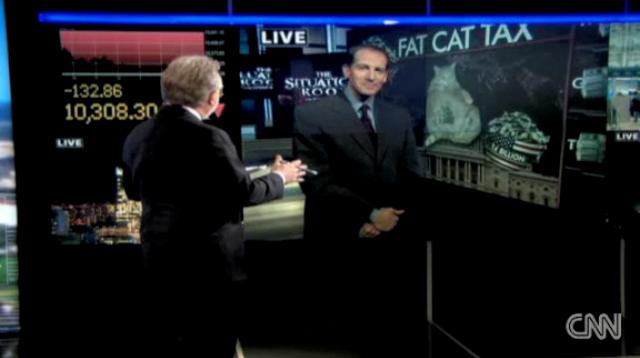
Wolf and Allan discuss the changing federal estate tax landscape.
In a December 17th segment on CNN’s The Situation Room, Wolf Blitzer and colleague Allan Chernoff began discussing the upcoming changes changes in the federal estate tax landscape. They point out that in just a few short days the calendar will turn and the reign of EGTRRA (the Bush tax cuts) over the estate tax comes to a close. No estate taxes will be owed on deaths occurring in the year 2010, but in 2011 the tax comes back at an even lower threshold, resetting to it’s pre-Bush rate of 41%-50% on assets over $1 Million. While all of this is perfectly accurate and well worth knowing, much of the commentary surrounding it was murky at best, if not just plain wrong. After the jump, some of the points that could use some tweaking:
The Changes are “Creating a Nightmare for Estate Planners”
Not really. There are a few considerations which make the environment significantly less stressful than Wolf would like to think. First, any competent estate planning attorney will draft tax planning documents by reference to the tax code – rather than reciting the dollar amounts in it – wherever possible, precisely so that they will yield the maximum benefits even if the tax rates change, as they will for next year. As for 2011, it’s true that the $1 Million threshold currently listed would expand the tax to many more people than presently covered, but the figure is highly unlikely to stay there. The tax bills that Congress use to alter estate taxes have always been massive tax overhaul bills that cover every other area of tax policy also. They’re huge undertakings that usually come once a decade and have an impact that spans presidencies. With the economy still in rough shape and Congress mired in healthcare reform, it’s easy to understand why a stop-gap measure for 2010 was recently voted down. Next year, with a cleaner slate for Congress and President Obama’s interest in repealing the Bush tax cuts and paying for new healthcare spending, a tax bill is likely, and an estate tax provision viewed by many as “going after the little guy” is not likely to survive.
The Estate Tax is a “Fat Cat Tax”
Sometimes, but not always. There’s no question that the most affluent Americans pay the bulk of the estate tax, but that doesn’t mean they pay all of it. I certainly don’t consider my auto mechanic to be a “fat cat,” but if he owns his home and the garage, and if he’s purchased enough life insurance to take care of his family and keep the business running, he (or his widow, if married) could have owed estate taxes under any system to date.
The “Fat Cats” Usually Avoid Estate Taxes with Tuition, Donations, and Gifts
Largely true, but incomplete. In the absence of any of the above, high net worth estate planning can squeeze $11 Million in assets into a a couples’ pre-tax threshold. Beyond that, chances are that an estate will owe some taxes.
As for the techniques mentioned in the segment, some are better than others. The tax code [§ 2503(e)] states that tuition paid on behalf of someone else – anyone else – is not a gift. It is very common for individuals to use this to reduce the size of their estate free and clear, and as some may prepay a full childhood of private schooling for every grandchild, it’s easy to see how those savings can be substantial. Charitable donations currently accomplish the same thing, but a cap on the income tax deduction for them is being tossed around in healthcare bill negotiations, whichcould place a damper on it’s effectiveness. Meanwhile, Allan’s implication that gifts to family are equally valid leaves out some key information, like that gifts over $13,000 per person per year are subject to an even harsher gift tax and eat away at your estate tax-free threshold. That’s fine for most upper-middle class suburbanites, but for the genuinely wealthy it hardly makes a dent.
The Final Verdict
Overall, it is true that the estate tax is repealed for next year and could could come back with a vengeance in 2011 if nothing is done, but that’s a big if. If you’re worried about how your estate plan may be effected by the changes it makes sense to discuss it with your attorney. Just remember to follow up later next year, where Congress may have put the system back on track, and remember that in most cases, things are probably fine as they are.
